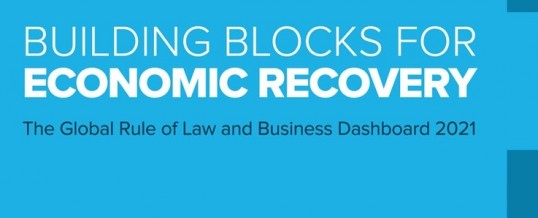
Today Dr David Torstensson presented the findings of the 2021 Global Rule of Law and Business Dashboard at the U.S. Chamber of Commerce in Washington D.C.
Titled Building Blocks for Economic Recovery the Dashboard offers the business community, governments, policymakers and stakeholders across the world an innovative, empirical tool to measure and understand the particular needs of the business community within a rule of law context. What are the issues that are important to business? What is currently being measured internationally? And what does this tell us about the rule of law and business globally?
The 2021 edition Dashboard builds on the work of the previous four editions. The number of economies sampled has over the course of the last eight years increased exponentially and the Dashboard now covers 113 economies in total.
Key Findings
Key finding 1: The global rule of law environment for business is showing signs of improvement.
There has been a real and statistically significant increase in the average aggregated score on the Dashboard since 2015. In the second edition of the Dashboard, the mean score was 51.63%; this year, the mean has increased to 58.35%—an improvement of 6.72%. Each edition of the Dashboard has shown a gradual improvement recorded over the seven-year study period.
Key finding 2: Despite such improvements, regional disparities persist, and no region outperforms the average score achieved by OECD economies.
None of the five major regions—Asia, the Americas, Europe and Central Asia, Sub-Saharan Africa, and the Middle East and North Africa—sampled in the Dashboard match or outperform the average score of 74.06% achieved by the 35 OECD member states sampled here. The mean score by economies sampled from the Europe and Central Asia region comes closest at 71.07%, but that figure is still more than 3% below the average achieved by OECD economies. Most economies sampled in the Dashboard are far behind the average OECD performance: Sub-Saharan Africa, the Americas, and the Middle East and North Africa regions—which together constitute more than half of the sampled economies—are 20% or more behind the OECD average.
Key finding 3: The COVID-19 economic recovery puts an emphasis on rule of law reforms for business.
Although the socioeconomic impact of the COVID-19 pandemic is global, current estimates suggest that the economic damage will be more extensive and recovery will take longer in emerging and developing markets; this projection is of real importance from a rule of law and business perspective. Few emerging markets or developing economies are among the highest performers in the Dashboard; no middle- or low-income economy appears in the top 20. Improvements to the rule of law environment for business can, and should, be part of the overall package of socioeconomic reforms being introduced and implemented around the world—and especially in middle- and low-income economies. A stronger rule of law will give both domestic and international businesses stronger structural incentives for investment and economic development.
To learn more about this project, the launch event and to access the report please use the below link:
ShareOCT
2021

About the Author:
David’s focus is policy and economic analysis related to innovation, health care, pharmaceuticals, tax and intellectual property. He has wide experience in quantitative research methods including index-building and data sampling and is the author of a number of both academic and commissioned publications. David’s knowledge spans from North America and Europe to the BRIC economies, and he speaks fluent Swedish. Prior to his work with Pugatch Consilium, David was with Deloitte LLP where he worked on a broad range of UK and international tax compliance and advisory projects. David holds a Master of Studies and DPhil (PhD) from Oxford University.